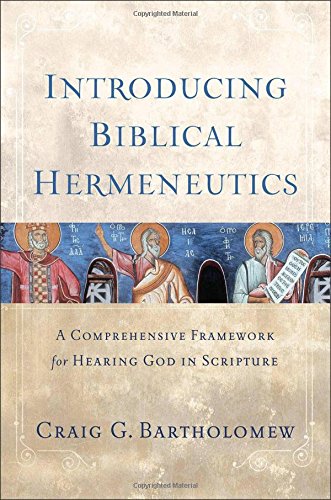 This year’s Institute for Biblical Research’s plenary speaker was Craig Bartholomew. He spoke on a biblical philosophy of history, which he draws out of the Old Testament, focusing in his talk on the view of God and history espoused in Ps 93, the first of the “YHWH mlk” psalms (“Yahweh reigns”). This theory comes largely out of his new hermeneutics book, Introducing Biblical Hermeneutics. He made five points from Ps 93:
This year’s Institute for Biblical Research’s plenary speaker was Craig Bartholomew. He spoke on a biblical philosophy of history, which he draws out of the Old Testament, focusing in his talk on the view of God and history espoused in Ps 93, the first of the “YHWH mlk” psalms (“Yahweh reigns”). This theory comes largely out of his new hermeneutics book, Introducing Biblical Hermeneutics. He made five points from Ps 93:
- History is guided by the God Yahweh. He is central to their worldview.
- He is immanently involved in the lives of his people; the temple gives him an address on earth.
- Yahweh is the transcendent creator.
- Yahweh is king over history but opposed within history.
- Yahweh is holy and everlasting but can be called upon by his people.
Drawing on the canonical reading of the Psalter, he notes how Book IV is a response to the bleak picture in Ps 89. The response to the seemingly failed Davidic line is that Yahweh reigns! The reign of God is God’s activity as creator and maintainer of the universe and he is judge and savior who moves the world toward his purposes. This view of history is somewhat unique in the ANE. There is also a growth in the awareness of this true sense of history throughout the OT. The development is cumulative, with the implicit becoming explicit and not contradictory.
 The OT and NT should be read together, with the entire canon shedding light on each of its parts (with Childs). If we are followers of Christ we are committed to a particular view of history. The details can be hashed over, but the big picture is clear. The OT commits us to the worldview of Yahweh being our ruler and sovereign. There is much diversity in modernity, but significantly, OT studies has emerged out of the Enlightenment. The OT worldview is proclaimed on Sunday but a different worldview is embraced for the study of the OT. This ought not to be.
The OT and NT should be read together, with the entire canon shedding light on each of its parts (with Childs). If we are followers of Christ we are committed to a particular view of history. The details can be hashed over, but the big picture is clear. The OT commits us to the worldview of Yahweh being our ruler and sovereign. There is much diversity in modernity, but significantly, OT studies has emerged out of the Enlightenment. The OT worldview is proclaimed on Sunday but a different worldview is embraced for the study of the OT. This ought not to be.
Regarding historical criticism, Bartholomew follows Plantinga’s epistemology to claim he doesn’t need to justify his beliefs that the OT is a legitimate witness to the past (a peek at his author index in his Introducing Biblical Hermeneutics shows a liberal use of Plantinga throughout the book). Historical criticism has made some valuable findings, but all theories are underdetermined; that is, it cannot explain all of the data. But have we become aware that historical criticism is so underdetermined that we are in a position that we must re-assess its value for the interpretation of the OT? Bartholomew believes so.
The two respondents were Sandra Richter and N. T. Wright (humorously, since Bartholomew named his presentation “Old Testament Origins and the Question of God”). Both were concerned that Bartholomew was being slippery with his terms and mixing up worldview and philosophy of history, and was not being clear on his use of the term “history,” which can have multiple meanings. Bartholomew responded that he was quite aware of philosophy of history issues and of the definitions of history, and that he was using them in line with current philosophical discussions.
Richter believes further that the psalms have a worldview, a view of history that can act as the foundation for a philosophy of history, but not as a philosophy of history itself. Bartholomew conceded the point to an extent. The rest of Wright’s response was criticizing Bartholomew for omitting Abraham’s role in history and spending the last five minutes explaining his own view of Abraham’s role in reversing the problems of Gen 1-11.
I was unaware of Bartholomew’s new book before this talk, but the book looks promising as an advanced textbook (for more academically inclined schools) or as a book in a seminar on hermeneutics. Bartholomew is interdisciplinary and reminded me much of Thiselton. The table of contents of his Introducing Biblical Hermeneutics is compelling, as you can see in Amazon’s Look Inside feature.
Click here to read our review of Introducing Biblical Hermeneutics. It’s a truly magnificent work.
